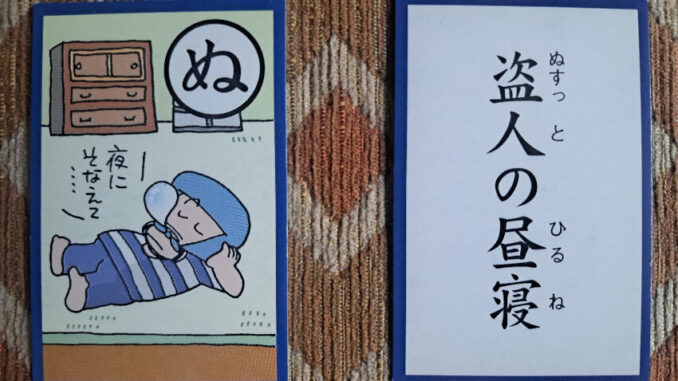
In my previous post about the Japanese “Iroha Karuta” playing card game I looked at a common proverb used to illustrate the tenth card in the sequence. The tenth card illustrates the tenth syllable in the old Japanese syllabary, the syllable “nu”.
That proverb was about a lotus growing in a “muddy pond” – a “NUmaike.”
The Edo and Osaka Karuta: A More Worldly-Wise Perspective?
The tenth karuta is another case of different card decks using different proverbs. My cheap and cheerful dime-store deck uses a different proverb that is apparently more common in Edo (old Tokyo) and Osaka decks, and offers a somewhat more worldly-wise or jaundiced view of the world than the image of a beautfiul lotus flowering on a turbid pond.
In the case of the Edo/Osaka proverb, it is more like an apparently innocent activity quite possibly having a nefarious intent. It goes like this:
盗っ人の昼寝 (ぬすっとのひるね)
Nusutto no hirune
The Translation Process
Okay, let’s translate it, bit by bit. There are only three bits to this one, so it should not pose too many problems…
- Nusutto (or “Nusubito”) = “nusu” + “hito” = “steal” + “person” = thief
- “no” indicates possession = ‘s
- hirune = “hiru” + “ne” = “afternoon” + “sleep” = siesta, or nap.
Put them together and you get a somewhat cryptic translation:
A thief’s siesta.
What on earth does that mean?
As is often the case, this proverb is elliptical and would be understood to mean:
盗人の昼寝も当てがある (Nusubito no hirune mo ate ga aru)
“Even a thief’s siesta has a purpose.”
The purpose of a thief’s siesta is of course to give him the energy to go out and steal during the night.
Interpretation
What the proverb points to is the idea that even an innocent-seeming idleness or inactivity can have its malevolent purpose. In short, there is a reason behind every action – or lack of action in this case – and not necessarily a good one.
Of Stillness And Muck
I like the contrast between the two proverbs that illustrate the syllable “nu”. Our previous proverb had a lotus floating beautifully on a mucky pond (NU-ma ike), which we might take as a form of stillness that is productive of beauty, whereas our worldly-wise Edo and Osaka version sees in the stillness of a snoozer the mucky intentions of thievery (NU-sumi).
Cheers!
David Hurley
#InspiredFocus without any hint of muckiness
